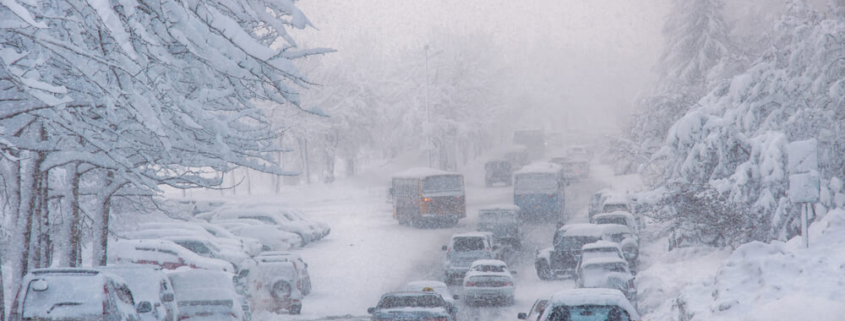Preparing your Vehicle for Pennsylvania Winter Weather
It is that time of year again. Summer is over, the temps are getting cooler, and winter is quickly approaching here in the Northeast. Aside from the uncomfortably cold (or more accurately, bone chilling) temperatures, one of most difficult aspects of dealing with winter weather is having to drive a vehicle in it. Very few people find it enjoyable to drive on icy and snowy roadways, and when the temps drop to well below freezing, it is especially hard on batteries and a lot of people are unable to start their cars.
There is no easy fix for driving in winter weather. You are most fortunate if you have a four-wheel-drive or all-wheel-drive vehicle, but even having all four wheels working is not enough to give you adequate traction when you hit a sheet of pure ice. The best you can do is prepare your car for winter weather and try to endure it. Or if you’re up for putting a more positive spin on things, you could even decide to embrace it
Prepare your Car Now for the Pennsylvania Winter Weather
We still have a month or two (hopefully) before the snow flies, and now is the time to get prepared. Here are some important steps to get your car ready for the Northeast winter weather:
Change Your Oil and Check Your Fluids
If your car is due for an oil change or close to the due date or mileage threshold, it is a good idea to get this done as soon as possible. Many vehicles require a different grade of motor oil in the winter, and you want to make sure you have the right grade for the kind of weather you are in. Most oil change services will also include a check of your important fluids, such as your antifreeze, washer fluid, etc. And they should also check your tire pressure to make sure your tires are properly inflated.
Have your Battery Checked
As we talked about earlier, cold temperatures are especially hard on batteries. Before the winter weather hits, it is always a good idea to have your battery checked over to make sure there is no corrosion at the terminals or other issues that could be causing it to lose charge. If necessary, replace your battery before the cold weather arrives. You can probably get a new battery for less than $100, and this small investment could save you a lot of headaches during cold winter days.
Consider Getting a Set of Winter Tires
Another thing you may want to consider investing in is a set of winter tires. If you have a four-wheel-drive or all-wheel-drive vehicle, you might not need these. But if your car is a front-wheel-drive or rear-wheel drive, then winter tires could make a big difference. Winter tires provide better traction and control and give you shorter stopping distances in snowy and icy weather.
Check your Wiper Blades
You will be using your wiper blades a lot during the winter, and you definitely do not want worn down or damaged blades that leave streaks on your windshield. Check out your wiper blades to make sure they are in good working order. If you need to replace them, they should not cost you more than $20 or so.
Get your Brakes Inspected and Serviced
You definitely do not want to go into the winter with a faulty braking system. It is difficult enough to stop on ice and snow with functional brakes, and worn out brake pads are the last thing you need to deal with. Have your brakes inspected and cleaned before winter. And of course, replace your braking system if necessary.
Get your Heating System Inspected
On cold winter days, you will need your heater to work – this is not optional. So, make sure to have your heating system inspected for any problems that need to be addressed.
Put Together Your Winter Emergency Kit
Everyone should have an emergency kit in case your car gets stalled on a cold winter day. Your kit should include a flashlight, blanket, warm clothes, a shovel, ice scraper, snow brush, and heat packs/hand warmers. You might also want to have some snacks in your car in case you get hungry while waiting for help.
Keep your Gas Tank at or Near Full
it is always recommended that you fill your gas tank every day during the winter, or at the very least, always have your tank at least half-full. When there is a lot of empty space in your tank, this can cause moisture buildup, which can dilute your fuel and severely diminish its quality and put a lot of strain on the vehicle pumps and other car parts.
Get Roadside Assistance and Keep their Phone Number Handy
Despite your best efforts, you need to be ready for the possibility that your car might break down somewhere. Before this happens, make sure you have roadside assistance. Most auto insurers offer this type of service within their policy, but their coverage is typically not as comprehensive as a service like AAA. Do your homework and find the roadside assistance service that is best for you, then put their phone number in your smartphone contact list for easy retrieval.
Drive Carefully
In addition to all of the other important preparation steps, the best piece of advice we can give you is to drive carefully. Do not drive faster than it is safe to travel under whatever conditions you are dealing with, always refrain from texting and other distracting activities while you drive, and allow plenty of distance between you and other vehicles and objects on the road.
Injured in a Winter Car Accident in Pennsylvania? Contact Caroselli, Beachler & Coleman for Assistance
Caroselli, Beachler & Coleman is committed to helping ensure that you and your family stay safe on the Pennsylvania roadways during the winter season and all year long. But even if you follow all the best safety practices, you cannot control what other drivers do.
If you or a loved one got injured in a vehicle accident in the winter or any other season, contact our experienced Pittsburgh auto accident attorneys for a free consultation to discuss your legal options. To get started, message us online or call our office today at 412-567-1232 or toll-free at 866-466-5789. We look forward to serving you!






